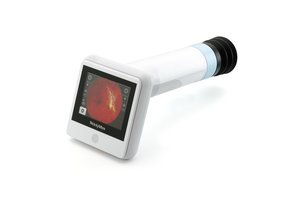As we grow older, so do our eyes. Our eyes work with our brains to interpret colors and images, choosing what to focus on and what to ignore. Understanding how the brain and eye work together is very complex, but simply put, our eyes visualize the world around us.
For people living with some form of diabetic retinopathy, the world around them may be hard to visualize. Diabetic retinopathy is the most common form of diabetic eye disease and the leading cause of blindness in adults age 20-74 with 12,000-24,000 new cases in the United States each year.
Diabetes is a condition that damages blood vessels, including the vessels found in our eyes that support vision. In early stages of the disease, symptoms often go unnoticed and are typically found in Type 1 or Type 2 diabetes. Early detection and treatment is crucial, especially because the disease can progress very rapidly. Over time, diabetes damages blood vessels in the retina and with diabetic retinopathy, these blood vessels leak blood and fluids into the eye.
Detecting Diabetic Retinopathy
Since symptoms often go undetected until vision issues become more severe, most diabetic patients don't realize the impact on their health and vision. The current standard of treatment for patients with diabetic retinopathy is to visit an ophthalmologist or optometrist for a dilated eye exam at least once a year if no disease is present. On average, less than 50% of patients who are referred to a specialist fail to comply with their annual exam. According to the National Eye Institute, early detection and treatment of diabetic retinopathy can prevent up to 95% of vision loss, so why aren't people complying with annual exams?
There are many challenges when it comes to complying with diabetic retinal exams. One challenge is lack of education. If patients aren't showing symptoms, they aren't following the recommended treatment process of seeing an eye specialist. Only half of patients or less comply with annual exams and a paradigm shift is necessary to decrease the number of people suffering from vision loss and blindness as a result of undiagnosed diabetic retinopathy.
lack of education. If patients aren't showing symptoms, they aren't following the recommended treatment process of seeing an eye specialist. Only half of patients or less comply with annual exams and a paradigm shift is necessary to decrease the number of people suffering from vision loss and blindness as a result of undiagnosed diabetic retinopathy.
With the number of patients being diagnosed with diabetes every year, people need to be informed of the opportunities. One opportunity to eradicate a leading cause of blindness and increase access to diabetic retinal exams is arming primary care providers with a solution that enables retinal assessment during a routine office visit.
Welch Allyn is leading the way with a turnkey solution that allows providers to examine diabetic patients in primary care settings to determine the risk for diabetic retinopathy. By offering diabetic retinal exams during a routine visit, disease can be detected earlier and patients can benefit from the convenience of having everything done in one visit. RetinaVue™ allows for the primary care physician or a medical assistant to capture encrypted fundus images.
These images are transmitted through HIPAA compliant software to a board-certified ophthalmologist at RetinaVue™ P.C., the largest tele-ophthalmology service provider in the U.S., to verify whether disease is present. In January 2018, RetinaVue P.C. received Joint Commission Accreditation for their dedication to improving patient-centered care. RetinaVue P.C. is one of the first tele-ophthalmology service providers to receive the esteemed quality recognition, which is typically reserved for hospitals and ambulatory care facilities.
It is no secret that we're dealing with a diabetes epidemic in the United States. The best way to help protect a patient’s vision is to keep them informed, encourage them to develop healthy habits and get their eyes checked regularly.
CME is proud to partner with Welch Allyn to provide the full line of its products to our customers. Call 800-338-2372 for more information.
About CME: CME Corp is the nation’s premier source for healthcare equipment, turnkey logistics, and biomedical services, representing 2 million+ products from more than 2,000 manufacturers.
With two corporate offices and 35+ service centers, our mission is to help healthcare facilities nationwide reduce the cost of the equipment they purchase, make their equipment specification, delivery, installation, and maintenance processes more efficient, and help them seamlessly launch, renovate and expand on schedule.



